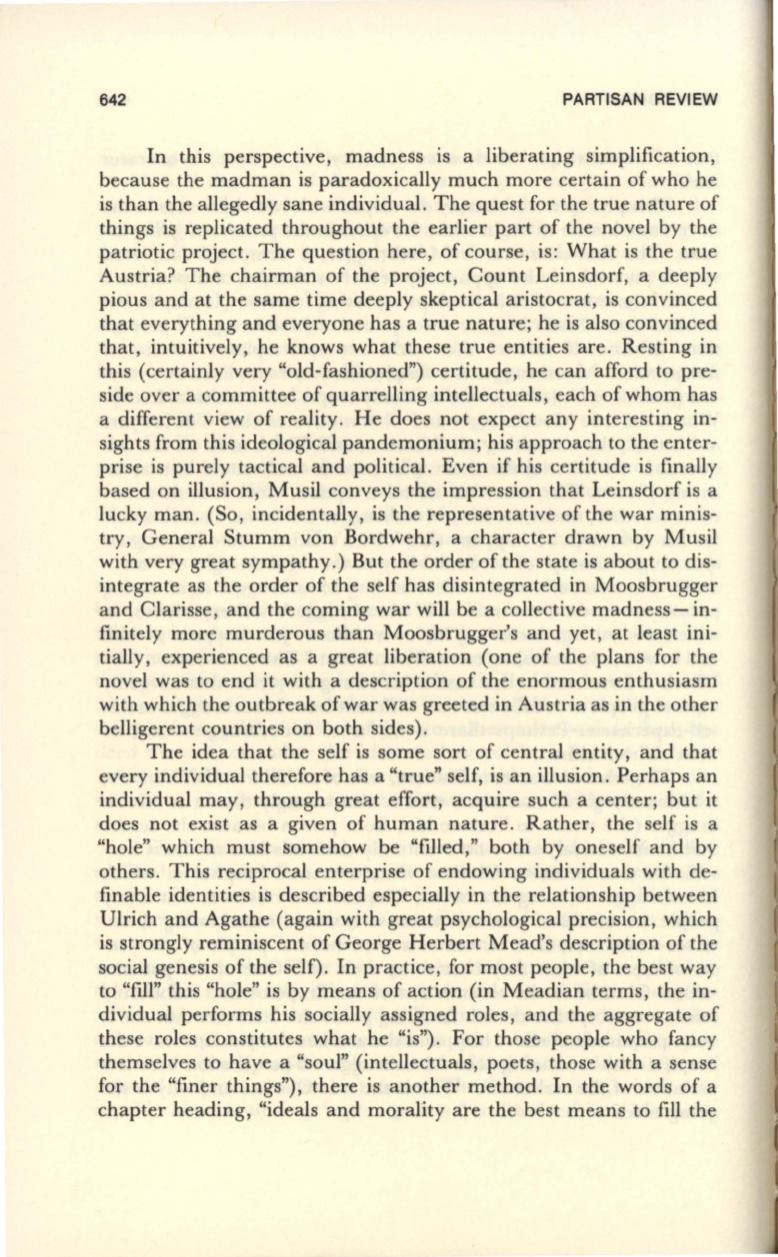
642
PARTISAN REVIEW
In this perspective, madness is a liberating simplification,
because the madman is paradoxically much more certain of who he
is than the allegedly sane individual. The quest for the true nature of
things is replicated throughout the earlier part of the novel by the
patriotic project. The question here, of course, is: What is the true
Austria? The chairman of the project, Count Leinsdorf, a deeply
pious and at the same time deeply skeptical aristocrat, is convinced
that everything and everyone has a true nature; he is also convinced
that, intuitively, he knows what these true entities are. Resting in
this (certainly very "old-fashioned") certitude, he can afford to pre–
side over a committee of quarrelling intellectuals, each of whom has
a different view of reality. He does not expect any interesting in–
sights from this ideological pandemonium; his approach to the enter–
prise is purely tactical and political. Even if his certitude is finally
based on illusion, Musil conveys the impression that Leinsdorf is a
lucky man. (So, incidentally, is the representative of the war minis–
try, General Stumm von Bordwehr, a character drawn by Musil
with very great sympathy.) But the order of the state is about to dis–
integrate as the order of the self has disintegrated in Moosbrugger
and Clarisse, and the coming war will be a collective madness- in–
finitely more murderous than Moosbrugger's and yet, at least ini–
tially, experienced as a great liberation (one of the plans for the
novel was to end it with a description of the enormous enthusiasm
with which the outbreak of war was greeted in Austria as in the other
belligerent countries on both sides).
The idea that the self is some sort of central entity, and that
every individual therefore has a "true" self, is an illusion. Perhaps an
individual may, through great effort, acquire such a center; but it
does not exist as a given of human nature. Rather, the self is a
"hole" which must somehow be "filled," both by oneself and by
others. This reciprocal enterprise of endowing individuals with de–
finable identities is described especially in the relationship between
Ulrich and Agathe (again with great psychological precision, which
is strongly reminiscent of George Herbert Mead's description of the
social genesis of the self). In practice, for most people, the best way
to "fill" this "hole" is by means of action (in Meadian terms, the in–
dividual performs his socially assigned roles, and the aggregate of
these roles constitutes what he "is"). For those people who fancy
themselves to have a "soul" (intellectuals, poets, those with a sense
for the "finer things"), there is another method. In the words of a
chapter heading, "ideals and morality are the best means to fill the


